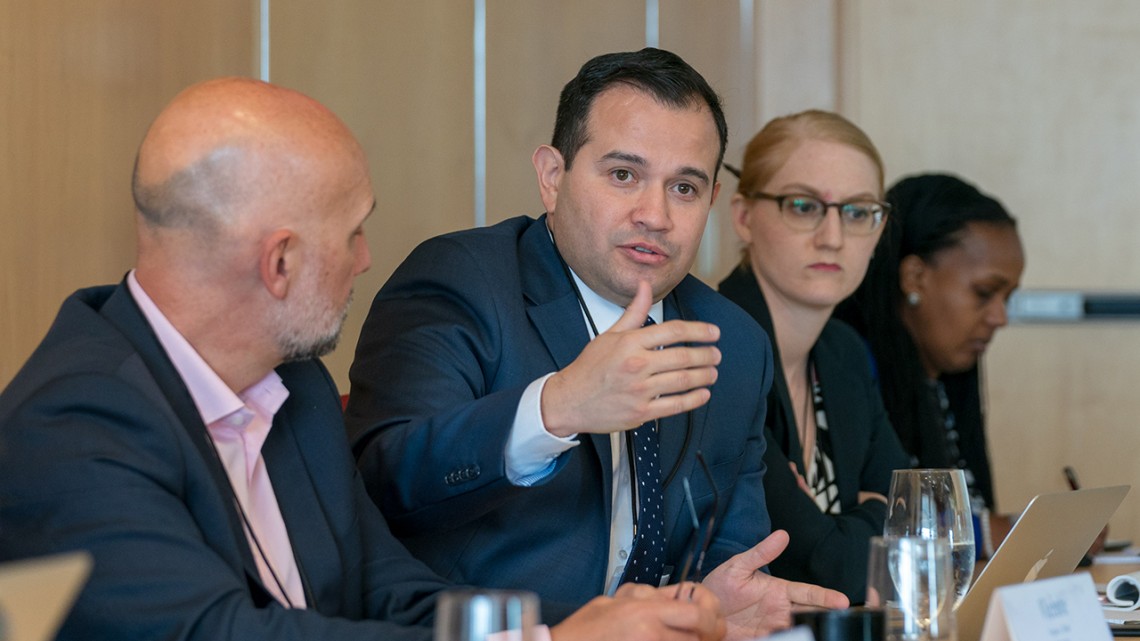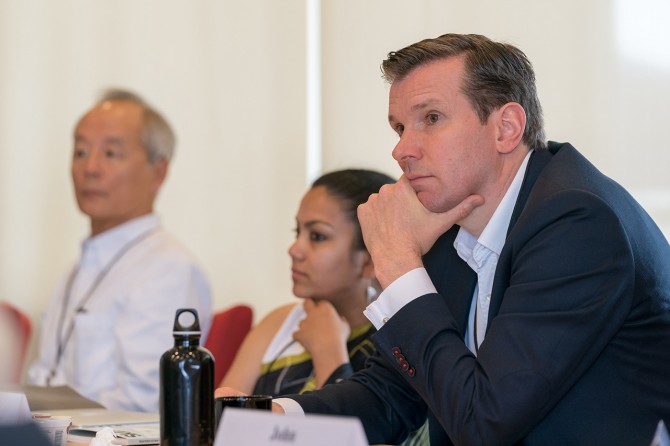
Juan Carlos Vargas, the managing principal at GeoAdaptive LLC speaks at the tourism roundtable, as Vincent Molés, from the Harvard Extension School, front, Kathleen Ahamed-Broadhurst, research manager from for the Cornell Sustainable Tourism Entrepreneurship; and Jacqueline Kariithi, a postdoctoral research fellow from Princeton listen.
Executives explore sustainable tourism at Pillsbury forum
By Blaine Friedlander
More than two dozen senior-level business executives and educators from around the world discussed emerging directions in sustainable tourism at a roundtable hosted by Cornell’s Pillsbury Institute for Hospitality Entrepreneurship and the Center for Sustainable Global Enterprise May 3 at Statler Hall.
The roundtable sought to develop new ways to evaluate, manage and maintain destination assets around the world. Neil Tarallo, the director of the Pillsbury Institute, welcomed the participants, while co-organizers Jeanne Varney ’85 and Mark Milstein, clinical professor of management, and the director for the Center for Sustainable Global Enterprise, gave opening remarks.
With strong tourism growth, sustainability is becoming a concern. In 2017, 1.2 billion international travelers had a visible impact on global gross domestic product – representing seven percent of the world’s exports, said Megan Epler Wood, managing director for the Center for Sustainable Global Enterprise's Sustainable Tourism Asset Management Program (STAMP) at the Samuel Curtis Johnson Graduate School of Management.
Tourism in emerging economies is having an impact, said Epler Wood. One in 10 jobs is tourism-related, and there is a 3.3 percent increase in tourism around the world last year, including 4.4 percent growth in tourism in developing countries.
“These are megatrends … I don’t see why government or business wouldn’t be celebrating these trends, because it represents enormous opportunity,” said Epler Wood.
But growth is fueling unsustainable consumption, and sewage treatment, excess water consumption and solid waste management are some of the biggest challenges for emerging economies. Many tourism professionals realize that some developing countries do not meet sanitation standards for its citizens, let alone tourists.
“Growth in tourism has impact on energy, water and waste. We are seeing those impacts undermine the very destination assets that support the industry,” said Milstein.
The day-long roundtable focused on several issues, including new models for sustainable destination management, innovative business models for managing tourism growth, managing climate change and business opportunities to make tourism more sustainable.
Neither tourists and travelers who journey to destinations, nor the public sector entities charged with managing those destinations look much beyond raw tourism growth numbers. Thus, “… there is a pressing need for more rigorous business research,” Milstein said.
“Bringing strong applied research to the sector should be helpful in developing more effective approaches to the sustainable management of tourism's destinations assets,” he said.
“That is why we launched STAMP,” Milstein explained. “Here at Cornell, the centers and institutes at the S.C. Johnson College of Business, together with others from around campus, including the Atkinson Center, give us unique resources to better understand a sector of the global economy that has serious social, environmental and economic effects.”
Said Milstein: “We all want to travel. Cornell wants to help make sure we have places worth traveling to in the future.”
Media Contact
Get Cornell news delivered right to your inbox.
Subscribe

